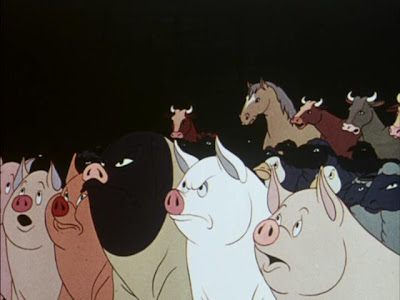(1954) Directed by Joy Batchelor and John Halas; Written by Lothar Wolff, Borden Mace, Philip Stapp, John Halas and Joy Batchelor; Based on the novella by George Orwell; Starring: Gordon Heath and Maurice Denham; Available on DVD
Rating: *** ½
“All animals are equal, but some animals are more equal than others.” – Animal Farm
Animal Farm is a darkly allegorical tale, based on George Orwell’s 1945 story with the same name. Although the main characters are farm animals, the subject matter is anything but typical Disney family fare. Its themes of inherent corruption in governing bodies must have hit unsuspecting audiences like a sledgehammer. Those who were looking for light entertainment were treated to a grim parable about the consequences of power left unchecked. While the thematic elements would be sufficient to cement Animal Farm’s place in history as a landmark in animated film, it has become notorious in recent years due to the recent revelation that it was at least partially funded by the CIA.
The story behind the film’s inception could easily be a film in itself. * Only a year after George Orwell’s death, the CIA identified Animal Farm as a potential propaganda tool to help combat the “red menace.” The organization promptly secured the film rights to Animal Farm by bargaining with Orwell’s widow. The price? She was promised that she could meet her movie idol, Clark Gable. Oddly enough, production of the animated film was awarded by Paramount to a British firm, Halas and Batchelor, led by John Halas and Joy Batchelor. This film would serve to be the first animated feature to come from Great Britain, and took more than two years to create.
* For more about the strange but true story behind the Animal Farm movie, be sure to check out Karl Cohen’s 2003 article in The Guardian, “The cartoon that came in from the cold.”
While the ideological intent behind the film’s production was motivated by cold war fears, Animal Farm’s themes are universal. We witness a demonstration of how a change in regime doesn’t necessarily result in the good of the people. After triumphing over their despotic human captor Mr. Jones, the animals of Manor Farm waste no time declaring that all animals are equal, and establishing a set of edicts. These lofty ideals quickly erode, however, as the pigs (led by the ambitious Napoleon) maneuver for control over the farm. Before long, Napoleon and his cronies have violated each of the laws that they’ve set in place. Notably, “No animal shall kill another animal” gains the addendum, “without cause.” In the end, the rulers have changed, but no one’s better off. Manor Farm, renamed “Animal Farm,” has become a thriving community, but at the expense of the workers, who toil away while their leaders become fat. The rest of the animals learn too late that they’ve simply traded one oppressor for another. This was pretty serious material for a medium that was commonly viewed as kid stuff at the time.
Animation director John F. Reed worked on various Disney animated films before joining Halas and Batchelor to work on Animal Farm. His influence undoubtedly involved adding little comic flourishes to an otherwise dour story, infusing some visual gags to temper the rather sober proceedings. While the animation lacked the polish of Disney productions from the same era (the characters are not as expressive or detailed), it was more than adequate to convey the story, and was easily several steps above the cut-rate animation that emerged in the 1960s. Despite the brief moments of levity, Animal Farm is much darker in tone than its Disney counterparts.
With the exception of Gordon Heath’s narration, Maurice Denham provided all of the voices heard in the film. Denham masterfully combined guttural animal noises with intelligible speech to create a variety of distinctive voices for the human and non-human characters. Heath’s narration is mostly superfluous, pointing out the obvious and making observations that could easily be ascertained through dialogue and action.
The finished film product represents a compromise between creating a commercially viable piece of entertainment and retaining the impact of Orwell’s original story. The decision to tamper with Orwell’s ending and conclude on a more upbeat note was made by the producers (possibly with some intervention by the film’s aforementioned investors), but ultimately provides little solace. After the grim events that preceded it, the victory seems especially hollow. We’re also left to ponder if the cycle will just repeat itself.
Animal Farm reaches beyond borders as more than just a cold war artifact. It represents a significant evolutionary step forward in animated storytelling. It prefigured by several decades other animated films that featured animal characters (such as Watership Down and The Plague Dogs) to convey mature subjects, rather than existing solely as cute diversions. Another important aspect of Animal Farm is its applicability to other situations – probably not what the creators (or shadowy funders had in mind). While the film’s target was communism, modern-day audiences could just as easily interpret the goings-on as an example of the unchecked excesses of capitalism. Exploitation is not the exclusive byproduct of any one ideology, but it can rear its head from many sources as people start with good intentions and eventually twist them around. Animal Farm exists outside of the context of the era when it was conceived, serving as a cautionary tale about downtrodden masses, whatever they might look like, or which side of the fence they stand.







I love that movie and I had read the book
ReplyDeleteThanks for stopping by! Glad to hear you enjoyed the film.
DeleteHi. I was wondering if I could use some of these pictures for a school project I'm doing on Animal Farm. It would be much appreciated. Thank you!
ReplyDeleteAbsolutely! Good luck with your project.
Delete